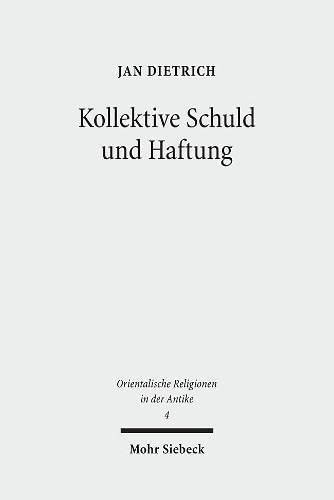
Kollektive Schuld und Haftung religions- und rechtsgeschichtliche Studien zum Sündenkuhritus des Deuteronomiums und zu verwandten Texten
English summary: The 'scapecow' ritual in Deuteronomy 21:1-9 is a central but almost unknown type of scapegoat ritual of the Hebrew Bible. In the case of a homicide caused by an unknown perpetrator, the parallels from ancient Near Eastern legal texts demand collective legal liability, while in the Deuteronomy passage a young cow is ritually killed as a substitute for the liability of the community. This is, according to Girard's and Burkert's perspectives, the genuine form of a scapegoat ritual, since the heifer is ritually killed, not merely sent into the wilderness. Thus the question arises: Is the violence of this ritual meant to resolve the violence of the homicide to unburden Israel from the demands of its collective guilt? To answer this question, the author provides a comprehensive history and analysis of this text, comparing it to its religious and judicial parallels from both the ancient Near East and the Bible, using historical methods from exegesis, cultural anthropology and comparative law. German description: Die exegetische und kulturanthropologische Diskussion um Sundenbockriten nimmt von Lev 16 ihren Ausgangspunkt, obwohl der eSundenkuhritus' von Dtn 21,1-9 ebenso Anspruch auf Auslegung im Rahmen dieser Diskussion verdient, enthalt doch Dtn 21,1-9 alle Momente, die fur einen klassischen Sundenbockritus wesentlich sind: die kollektive Schuldproblematik durch den Totschlag von unbekannter Hand, die ersatzweise Elimination und Totung der jungen Kuh sowie nicht zuletzt die mehrfache Verwendung der Begriffe aBlut(schuld) und aSuhne. Deshalb unternimmt Jan Dietrich in der vorliegenden Studie eine religions- und rechtsgeschichtliche Untersuchung zu Dtn 21,1-9 und verwandten Quellen, die den Text sowohl im Licht der exegetischen und kulturanthropologischen Deutung von Sundenbockriten interpretiert als auch in den grosseren Zusammenhang kollektiver Schuldproblematik stellt.